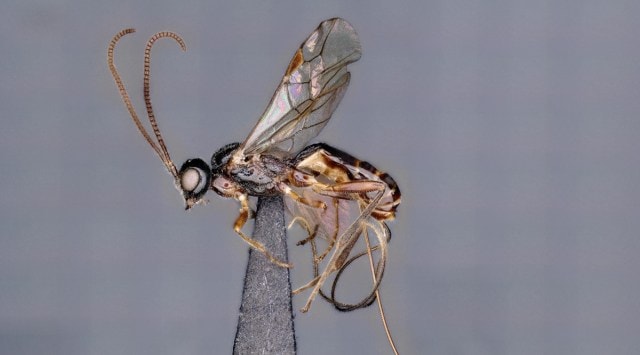- India
- International
New genus of wasp named after environmental think tank
Named after the Ashoka Trust for Research in Ecology and Environment (Atree), this is the first time in India an institute has an eponymous insect.
 Atree Rajathae
Atree RajathaeWith the discovery of a new species of wasp, Atree Rajathae, and two others already known species Baeacis Improcerus, Baeacis Validus, a new genus of Braconid wasps was named after research institution and environmental think tank Ashoka Trust for Research in Ecology and Environment (Atree). This is the first time in India an institute has an eponymous insect.
The new genus belongs to the tribe Diospilini of subfamily Brachistinae. The tribe Diospilini consists of 13 genera and 125 species that are mostly distributed in the Palaearctic region. There are only six species known from the Indomalayan realm and Atree Rajathae is the first report of the tribe Diosplini from India.
The newly-described species is a parasitoid wasp. Parasitoids are the most important natural enemies of other insects and humans exploit this behaviour for the biological control of crop pests. The other two known Taiwanese species, Baeacis Improcerus and Baeacis Validus, were also transferred to the new genus, considering their morphological affinities to Atree.
The discovery of the new genus was facilitated by the researchers from Atree who had collaborated with Cornelis Van Achterberg (Naturalis Biodiversity Center, Leiden, The Netherlands) for comparative studies with other braconids.
“The discovery of this new and unique genus is once again a testament of how little we know of the incredible diversity of the parasitoid wasps in India. The Western Ghats is a treasure trove of many such undescribed invertebrate taxa still unknown to Science,” said Dr Ravikanth G, the Acting Director of Atree.

According to Priyadarsanan Dharma Rajan, the senior author of the paper, “Agasthyamala Biosphere Reserve is well known for its plant diversity and high levels of endemism. The insect diversity of this critical biodiversity area is largely under-explored.”
He added, “When we conducted a survey of dung beetles in the Shendurney wildlife sanctuary, which is a part of the Agasthyamala Biosphere Reserve, it yielded more than 80 species or 20 per cent of India’s dung beetle fauna. A thorough exploration for the insect diversity of Western Ghats can bring out not only a large number of new taxa but many interesting stories revealing the biogeography of the region, as well the importance of insects in sustaining life on earth.”
“The discovery of a new genus of wasps by the Atree team is a very significant finding. E O Wilson of Harvard University, perhaps the most celebrated biodiversity specialist, who passed away a few months ago, once remarked that it is the small things that run the world. Wilson’s point was that our focus in biodiversity conservation on large mammals is somewhat misplaced. All creatures, big and small, are important components of nature and play critical roles in the functioning of the ecosystems that are declining all over the world. It is appropriate that as Atree celebrates its 25th anniversary, the newly-discovered genus is named after Atree,” said Kamal Bawa, president of Atree.
A large number of insects were collected about a decade and a half ago to address large gaps in the insect inventory in the Western Ghats. These collections were sorted to family and preserved in the ATREE Insect Museum (AIMB).
Recently, owing to the pandemic, Atree entomologists were largely confined to their laboratory and analysed the parasitic Hymenopterans in these old collections. So far, they have sorted out more than 80 potentially-new species from the Western Ghats, one of the global biodiversity hotspots. In 2021, Atree entomologists described as many as 20 new species of insects from these collections.
Apr 30: Latest News
- 01
- 02
- 03
- 04
- 05






























